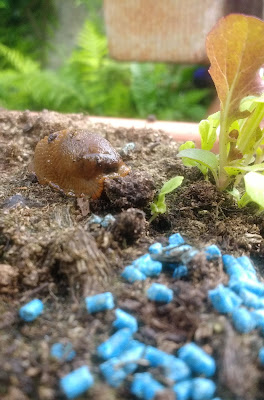I see slug pellets containing metaldehyde are staying on the
market. I mentioned a few weeks ago they were to be off the retail shelves by
early next year. The ban was overturned in the high court after a challenge
from Chiltern Farm Chemicals who manufacture the product.
As expected social media went into meltdown with a call to
overturn the ruling, which probably won’t happen anytime soon. What isn’t
really mentioned is that slug pellets are used in industrial agriculture in
huge amounts and until the mono crop production of farming shifts the demand
will be there and laws won’t change.
The industry is trying to lower the amount of metaldehyde
being used by reducing the size of the pellets and have cut down the dose rate
from 210g/ha to 60g/ha, so they are taking a bit of action. The products also
have something called Guardsman added which makes the pellets unpalatable to
birds and mammals. I haven’t been able to find any research to see how precise
this is and if mammals are harmed indirectly by eating poisoned slugs so can’t
really comment about it’s effectiveness at the moment.
You might be aware of vegetables on the supermarket shelves
being organic but there’s never any mention about slug deterrents being used.
The drinking water Inspectorate is also ensuring metaldehyde doesn’t reach
drinking water in agricultural use but isn’t monitored in the private garden.
Farming is why the ruling has been overturned. Protests from
home gardeners on social media doesn’t really have any clout at the moment, but
that could change.
We might seem powerless to alter what the huge industrial
agricultural businesses are doing but we can make a change in our own gardens.
If the use of metaldehyde slug pellets is an issue for you and you really don’t
want to use them, use one of the many alternatives on the market, either shop
bought or home-made.
We’ve come a long way since gardeners such as Percy Thrower
pushed a multitude of endorsed ICI chemical products on us to attack everything
in the garden. We now see our plots are
a more balanced ecosystem where everything has a purpose.
There isn’t a “good or bad” or “friend or foe” in the
garden, it’s more to do with how we keep the garden healthy to overcome issues
as and when they arise.
By starting our own fruitful, strong, and diverse
self-maintaining garden, which is more cost effective to run than a garden
where chemicals are needed we might just quietly influence the change from
monoculture as it becomes more expensive to be productive.
Ha Ha
Talking of bans and restrictions I can’t help but notice
that right of ways and access to the countryside seems to be on the decline. Once
open areas of our countryside are becoming closed off, even grassland on the
perimeter of beaches are no go areas. Fences are going up and even in some
extreme cases non-drying bitumen paint is put on gates. I know of one area near
Neds Point where an access path to the beach, used for over a hundred years now
has a six foot wall blocking access with cemented in broken glass along the top
to deter (or injure) any ramblers. The large field adjoining it has also been
dug up and furrowed to make access near impossible so it’s not about keeping
livestock in, it’s about keeping people out. I appreciate the claim culture can
install fear into landowners to block access but sometimes you think a small
sign with ‘Persons walking do so at their own risk’ would suffice.
There are ways to make areas secure (for livestock) without
fences and visible signs of restrictions. I lived in a large house many moons
ago where the garden had a Ha-Ha around the garden. Think of it as a moat but
with no water in it and one side was at 45 degrees and grass. It’s a landscape
design element that creates a vertical barrier while preserving an
uninterrupted view of the landscape beyond.
The name "ha-ha" is thought to have stemmed from
the exclamations of surprise by those coming across them, as the walls were
intentionally designed to be invisible, which is where the rub lies. Health and
safety probably wouldn’t allow them now.
Before mechanical lawn mowers, a common way to keep large
areas of grassland trimmed was to allow livestock, usually sheep, to graze the
grass. A ha-ha prevented grazing animals on large estates from gaining access
to the lawn and gardens adjoining the house, giving a continuous vista to
create the impression that the garden and landscape were one and undivided. At
least with a Ha-ha you would be given the illusion of access and freedom to
roam without all of the barriers going up in the countryside.
Check out the Keep Ireland Open page here
Check out the Keep Ireland Open page here
